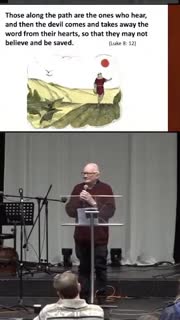Listening: The Key to Effective Witnessing and Discipleship
Devotional
Sermon Summary
Bible Study Guide
Sermon Clips
### Quotes for Outreach
1. "You know, sharing your faith with people is something we all love doing, isn't it? Because it's so easy, isn't it? I don't think so. It's actually so scary. Because we sit there and we wonder, what are we going to say? What words will I say? And we get somehow tongue-tied." [38:51] (19 seconds)
2. "I want to tell you that I think the key to witnessing is actually not about what you say. Now, I know I've spent a lot of time working out what to say and how to say it. But it's actually about listening. And when you look at this parable, it's about people hearing the word and how they respond. Did you hear that? Hearing the word. It's about listening." [39:54] (27 seconds)
3. "You see, sowing seeds into friends takes time. I don't know how long it will take, but I'm praying that this man will come to know Jesus personally. But there's a lot of muck to work through, a lot of religious stuff to get rid of. And I can't do it, but God can. And in the meantime, I'll just keep praying for him." [47:55] (28 seconds)
4. "I want to encourage you to pray. I want to encourage you to pray and ask the Holy Spirit to open up some opportunities with those people. Because this is about real life and death. It's not about whether they come to church here or somewhere else. That's great. We love coming here, love being in this place. It's about their eternal life." [48:52] (28 seconds)
5. "When we read the scriptures, it's so important. I admire those people who sit there and they're on a plan to read the whole Bible in 12 months. You know, I've started that a few times, but somehow I've run out of steam before I got too many months into it. But when I read the scriptures, I always want to prepare myself to say, God, what do you want to teach me today?" [57:34] (25 seconds)
### Quotes for Members
1. "I said earlier that the key to witnessing is listening. Not so much about how you say. And I've tried to change my own methods and listen. Listen to what the Holy Spirit's telling me. Listen to the Holy Spirit and allow him to work out what to say. Not me working out some prearrangement. Not prearranged talk that I think is a good way to do it." [44:05] (29 seconds)
2. "I believe witnessing is about listening. A couple of months ago, I started in a new job as a chaplain in one of Anglicare's residential homes. So I get to talk to Jesus, at least about people, about Jesus, three days a week. It's lovely. I love it. But not everyone believes about Jesus. Not everyone's a Christian, including with the staff. Not everyone's a Christian. But I get to be somehow some sort of representative of Jesus and share about him." [45:43] (37 seconds)
3. "I want him to grow in the Lord and I don't know how long this investment in him is going to be but I want him to grow. I want him to discover the truth of who Jesus is and how at this very late stage in his life how important that is. I think the average age in my residential care home is 80 there's at least five or six people that are over 100 but there are some people that are younger than me there and not all of them know Jesus." [56:24] (29 seconds)
4. "I love the fact that I can hear God's voice speaking to me. Yeah, I wish it was louder sometimes. I wish it was clearer. I wish it was written down. I wish at least he'd send me a memo with it on there. I wish all of those things because it would make it easy. I wish he'd write it on the wall or something. But his voice is there. I just need to listen better." [58:43] (24 seconds)
5. "I said at the start of this message, maybe the band would have come up. I said that the key to effective witnessing. Is really good listening. Listening to God first and foremostly. Listening to the people we talk to. Listening for his leading on how. How to share with others the good news." [59:43] (26 seconds)
Ask a question about this sermon
1. "You know, sharing your faith with people is something we all love doing, isn't it? Because it's so easy, isn't it? I don't think so. It's actually so scary. Because we sit there and we wonder, what are we going to say? What words will I say? And we get somehow tongue-tied." [38:51] (19 seconds)
2. "I want to tell you that I think the key to witnessing is actually not about what you say. Now, I know I've spent a lot of time working out what to say and how to say it. But it's actually about listening. And when you look at this parable, it's about people hearing the word and how they respond. Did you hear that? Hearing the word. It's about listening." [39:54] (27 seconds)
3. "You see, sowing seeds into friends takes time. I don't know how long it will take, but I'm praying that this man will come to know Jesus personally. But there's a lot of muck to work through, a lot of religious stuff to get rid of. And I can't do it, but God can. And in the meantime, I'll just keep praying for him." [47:55] (28 seconds)
4. "I want to encourage you to pray. I want to encourage you to pray and ask the Holy Spirit to open up some opportunities with those people. Because this is about real life and death. It's not about whether they come to church here or somewhere else. That's great. We love coming here, love being in this place. It's about their eternal life." [48:52] (28 seconds)
5. "When we read the scriptures, it's so important. I admire those people who sit there and they're on a plan to read the whole Bible in 12 months. You know, I've started that a few times, but somehow I've run out of steam before I got too many months into it. But when I read the scriptures, I always want to prepare myself to say, God, what do you want to teach me today?" [57:34] (25 seconds)
### Quotes for Members
1. "I said earlier that the key to witnessing is listening. Not so much about how you say. And I've tried to change my own methods and listen. Listen to what the Holy Spirit's telling me. Listen to the Holy Spirit and allow him to work out what to say. Not me working out some prearrangement. Not prearranged talk that I think is a good way to do it." [44:05] (29 seconds)
2. "I believe witnessing is about listening. A couple of months ago, I started in a new job as a chaplain in one of Anglicare's residential homes. So I get to talk to Jesus, at least about people, about Jesus, three days a week. It's lovely. I love it. But not everyone believes about Jesus. Not everyone's a Christian, including with the staff. Not everyone's a Christian. But I get to be somehow some sort of representative of Jesus and share about him." [45:43] (37 seconds)
3. "I want him to grow in the Lord and I don't know how long this investment in him is going to be but I want him to grow. I want him to discover the truth of who Jesus is and how at this very late stage in his life how important that is. I think the average age in my residential care home is 80 there's at least five or six people that are over 100 but there are some people that are younger than me there and not all of them know Jesus." [56:24] (29 seconds)
4. "I love the fact that I can hear God's voice speaking to me. Yeah, I wish it was louder sometimes. I wish it was clearer. I wish it was written down. I wish at least he'd send me a memo with it on there. I wish all of those things because it would make it easy. I wish he'd write it on the wall or something. But his voice is there. I just need to listen better." [58:43] (24 seconds)
5. "I said at the start of this message, maybe the band would have come up. I said that the key to effective witnessing. Is really good listening. Listening to God first and foremostly. Listening to the people we talk to. Listening for his leading on how. How to share with others the good news." [59:43] (26 seconds)










